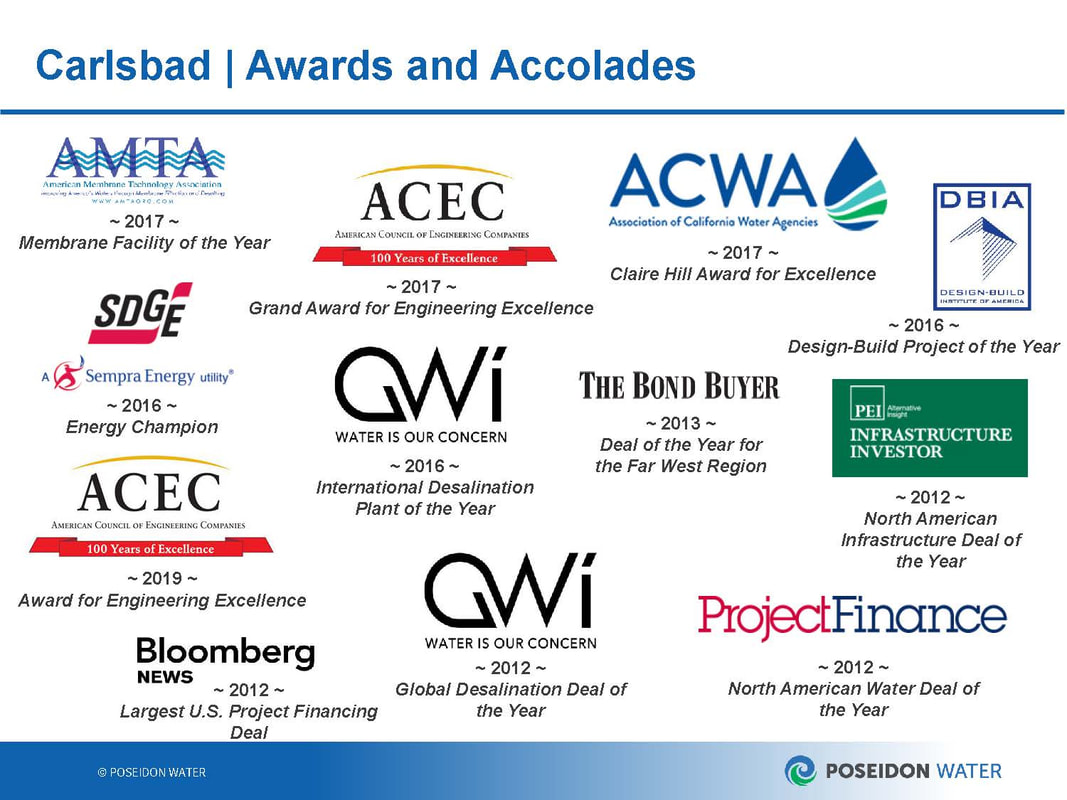|
State Standard Assures More Protection for Fish and Marine Life SAN DIEGO – The San Diego Regional Water Quality Control Board today renewed a permit governing discharges from the Claude “Bud” Lewis Carlsbad Desalination Plant into the Pacific Ocean that includes structural and operational changes to provide greater protection for marine life and water quality. The Board’s action authorizes the facility’s owner, Poseidon Water, to construct a stand-alone pumping station to draw its seawater and build a new intake structure with smaller screens to reduce the number of fish sucked into the plant. The permit also establishes more stringent brine discharge guidelines to minimize the toxic impact on bottom-dwelling marine life and requires Poseidon to offset potential harm by creating 68.3 acres of wetlands in south San Diego Bay.
“Desalinated water, as regulated by the permit for Poseidon, is an important component of our overall water supply portfolio,” said San Diego Water Board chair Henry Abarbanel. The updates are expected to increase the facility’s drinking water production from 54 to 60 million gallons per day, a significant boost in light of the region’s arid climate and inevitability of droughts. The renewed permit supports the use of ocean water as a reliable supplement to traditional water supplies and features a number of environmental protections adopted by the State Water Board in its Desalination Amendment in May 2015. California is a world leader in desalination permitting and environmental protection. Located 30 miles north of San Diego on the shores of the Agua Hedionda Lagoon, the Carlsbad plant is the largest and most technologically advanced seawater desalination project in the Western Hemisphere. The project relies on reverse osmosis, a filtering process that separates salt from seawater and eliminates impurities such as bacteria and viruses. Approximately 100 million gallons per day of ocean water from the adjacent lagoon enters the plant through a 72-inch pipe, then cycles through a multi-layer tank that uses sand, gravel and anthracite to remove algae and other large impurities. Then, a reverse osmosis cycle removes the salt. Once the filtering is complete, the potable water is disinfected with chlorine and pumped to retailers throughout the county. The brine that remains is diluted with seawater and returned to the ocean. “In approving the permit,” Abarbanel said, “the Board balanced the environmental impacts and costs of source water intake and brine disposal for the next several decades with the many beneficial uses of the Pacific Ocean and Aqua Hedionda Lagoon.” Poseidon sells its product to the San Diego County Water Authority, which supplies 10 percent of the county’s drinkable water. While Carlsbad is one of 12 existing desalination plants in California - a state that more heavily relies on conservation, recycling, stormwater capture and groundwater recharge for its water supply - ocean filtration systems operate in more than 120 countries and are considered a vital water source alternative in many regions, particularly the Middle East, the Mediterranean and the Caribbean. Israel’s extensive and effective use of desalination to counter chronic drought conditions is frequently cited as a success story, and in fact, the company contracted by Poseidon to operate the Carlsbad plant is the Israel-based Desalination Enterprises. Desalination programs currently provide more than 50 percent of water for Israeli households, agriculture and industrial use, with some projecting the percentage to reach 70 percent by 2050. To learn more about desalination issues, visit the State Water Resources Control Board’s website at waterboards.ca.gov. Download a pdf of this article.
0 Comments
Your comment will be posted after it is approved.
Leave a Reply. |
What's the latest?
|
All Rights Reserved. Contact | Login.


 RSS Feed
RSS Feed